逐句精讲新概念英语第二册第49课美梦告终
裕兴新概念英语第二册笔记第49课之欧阳化创编
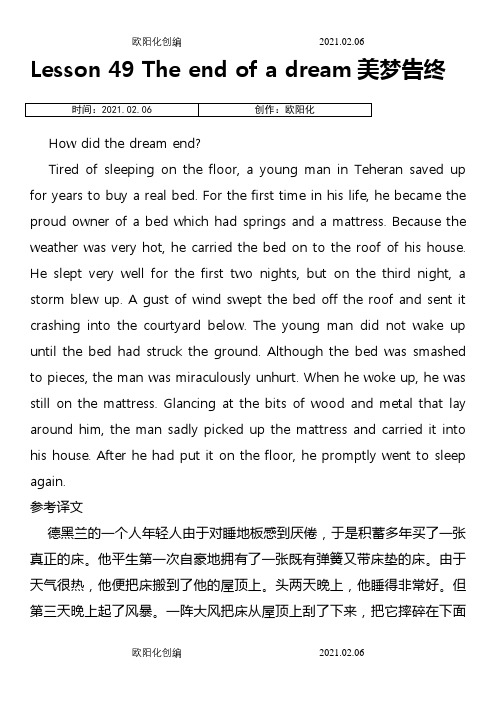
Lesson 49 The end of a dream美梦告终How did the dream end?Tired of sleeping on the floor, a young man in Teheran saved up for years to buy a real bed. For the first time in his life, he became the proud owner of a bed which had springs and a mattress. Because the weather was very hot, he carried the bed on to the roof of his house. He slept very well for the first two nights, but on the third night, a storm blew up. A gust of wind swept the bed off the roof and sent it crashing into the courtyard below. The young man did not wake up until the bed had struck the ground. Although the bed was smashed to pieces, the man was miraculously unhurt. When he woke up, he was still on the mattress. Glancing at the bits of wood and metal that lay around him, the man sadly picked up the mattress and carried it into his house. After he had put it on the floor, he promptly went to sleep again.参考译文德黑兰的一个人年轻人由于对睡地板感到厌倦,于是积蓄多年买了一张真正的床。
新概念英语第二册49

10. After he had put it on the floor, he promptly went to sleep again. 他把床垫往地板上一放,很快又睡着了。
这里went to sleep也就相当于fell asleep(同样用的 是过去式)。
Phrases
be tired of doing sth. 对做某事感到厌倦 save up 储蓄,存钱 blow up 爆炸;给轮胎打气;吹气球;
Text Analysis 1. Tired of sleeping on the floor, a young man in Teheran saved up for years to buy a real bed. 德黑兰的一个年轻人由于对睡地板感到厌倦,于是积蓄 多年买了一张真正的床。 (1)tired引导的分词短语省略了开头的being,其作用相 当于原因状语从句:As he was tired of…。sleeping为动 名词,作介词of的宾语。 (2)save up表示“储蓄”、“攒钱” I want to get married in one or two years, so I'm trying to save(some money)up. 我想一两年之间内结婚,所以我在设法攒钱。 (3)to在这里用于表示目的,相当于in order to: I got up early to have a swim. 为了游泳我起了个大早。
2. For the first time in his life, he became the proud owner of a bed which had springs and a mattress. 他平生第一次自豪地拥有了一张既有弹簧又带床 垫的床。 Spring作名词有“发条、弹簧”的意思。 spring n. ①春天 ②泉水 hot spring If winter comes, can spring be far behind?
新概念英语第二册第49课 the end of a dream 美梦告终
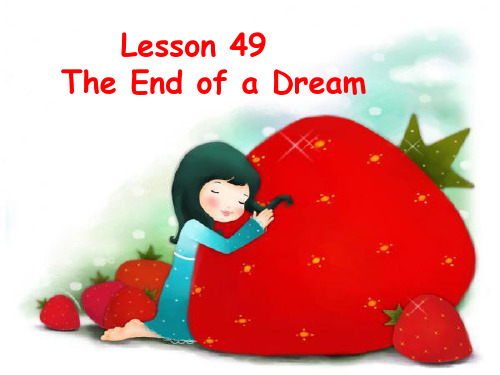
Iv. Language points
5.奇迹般地 miraculously
活学活用
他奇迹般地逃过了这次 剧烈的爆炸。 He miraculously survived the violent bombing.
Iv. Language points
→ n. miracle 奇迹 There can be miracles when you believe. 只要你相信就会有奇迹。
Next…
Iv. Language points
Iv. Language points
1.厌倦某事/厌倦做某事 be tired of sth/ doing sth
活学活用
当一个人厌倦伦敦 时,他必定也厌倦 了人生。 When one is tired of London, he is tired of life. ----Samuel Johnson
Lesson 49 The End of a Dream
The End of a Dream
I. Warm-up New words & expressions
II.
V. Key structures &usage
IV Language points &Text Analysis
III. Main idea
glance at 扫了一眼(有意识地看) glare at 瞪着(生气的) stare at 盯着 gaze at 盯着(无限神往, 羡慕地看)
8. real adj. 真正的 (强调东西不是假的) true adj. 真挚, 真诚, 符合标准 (强调符合某 个标准) real man 真人;true man 男子汉,好汉
新概念第二册Lesson 49 The end of a dream讲义

新概念第二册Lesson 49 The end of a dream一、单词精讲tired adj. 厌烦的引申:“tired”最基本的意思是“疲倦的”,当表示“厌烦的”时,是一种引申含义。
I'm tired of this boring work.”(我厌烦这个无聊的工作了。
)这里从身体上的疲倦延伸到心理上对某事的厌烦情绪。
词源:“tired”源自古英语的“tīred”,它最初的意思是“疲倦的,疲惫的”,随着语言的发展,逐渐有了“厌烦的”这一含义。
搭配:be tired of:这是最常见的表示“厌烦……”的搭配。
She is tired of listening to his complaints.(她厌烦听他的抱怨了。
)“get tired of”:强调从一种不厌烦到厌烦的转变过程。
You will get tired of this game sooner or later.(你迟早会厌烦这个游戏的。
)real adj.真正的引申:“real”作为“真正的”这个含义,可引申出“真实存在的”“切实的”等意思。
例如,“real situation”(真实的情况),这里表示情况是实际存在而非虚构的;“real problem”(切实的问题),强调问题是真实且需要解决的。
词源:“real”来源于拉丁语“realis”,其最初的含义与事物的本质、实际存在相关。
搭配:real name(真名),这是比较常见的搭配,用于表示一个人的真实姓名,区别于笔名、化名等。
real estate(房地产;不动产),在这个词组中,“real”表示真实的、实际的财产。
for real(认真的;严肃的;真正的),这是一个口语化的短语,Are you for real?(你是认真的吗?)owner n. 主人引申:“owner”作为“主人”,可引申为拥有者、所有者,在很多情况下表示对某个事物具有所有权的人或主体。
例如在商业语境下,“the owner of a company”(公司的所有者),这里的“owner”不仅是公司的主人,还拥有对公司的各种权益。
新概念二49课The end of a dream课文讲解AntAngelia
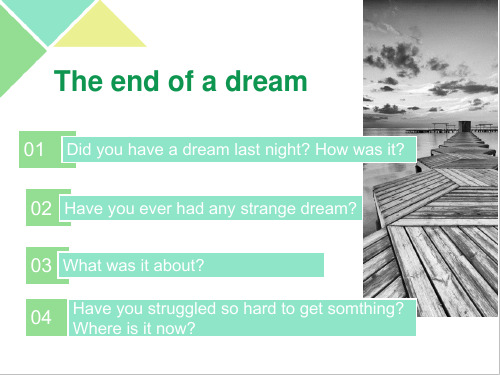
01
Did you have a dream last night? How was it?
02 Have you ever had any strange dream?
03 What was it about? 04
Have you struggled so hard to get somthing? Where is it now?
Listen and answer these questions.
• How did the dream end?
• What happened to his bed? • Where did he sleep a year ago?
Tired of sleeping on the floor, a young man in Teheran saved up for years to buy a real bed. • be tired of
the third night
on the night of this Mondy Nov. 1st
at night in the morning in the afternoon in the evening
blow up
• Can you lend me a pump to blow up my bicycle tyres? • She had never thought he'd blow up so violently. • Enemy planned to blow up the plant.
Glancing at the bits of wood and metal that lay around him, the man...
新概念英语第二册学生用书Lesson49

新概念英语第二册学生用书Lesson49Lesson 49 The end of a dream 美梦告终First listen and then answer the question.听录音,然后回答以下问题。
How did the dream end?Tired of sleeping on the floor, a young man in Teheran saved up for years to buy a real bed. For the first time in his life, he became the proud owner of a bed which had springs and a mattress. Because the weather was very hot, he carried the bed on to the roof of his house. He slept very well for the first two nights, but on the third night, a storm blew up. A gust of wind swept the bed off the roof and sent it crashing into the courtyard below. The young man did not wake up until the bed had struck the ground. Although the bed was smashed to pieces, the man was miraculously unhurt. When he woke up, he was still on the mattress. Glancing at the bits of wood and metal that lay around him, the man sadly picked up the mattress and carried it into his house. After he had put it on the floor, he promptly went to sleep again.和短语语New words and expressions 生词和短tired(1.1)/tai+d/adj.厌烦的courtyard (1.7)/'k&:tja:d/n.院子real (1.2)/ri:l/adj.真正的smash(1.8)/sm$M/v.碰碎.摔碎owner (1.3)/'+un+/n.主人miraculously (1.9)/mi'r$kjul+sli/adv.奇迹般地spring (1.3)/spriR/n.弹簧unhurt(1.9)/)n'h+:t/adj.没有受伤的mattress (1.3)/'m$tr+s/n.床垫glance(1.9)/gla:ns/v.扫视gust(1.6)/g)st/n.一阵风promptly(1.11)/'pr&mptli/adv.迅速地sweep(1.6)/swi:p/(swept/swept/,swept)v.扫,刮文注释释Notes on the text 课文注1 Tired of sleeping on the floor, 由于对睡地板感到厌倦。
逐句精讲新概念英语第二册:第49课美梦告终
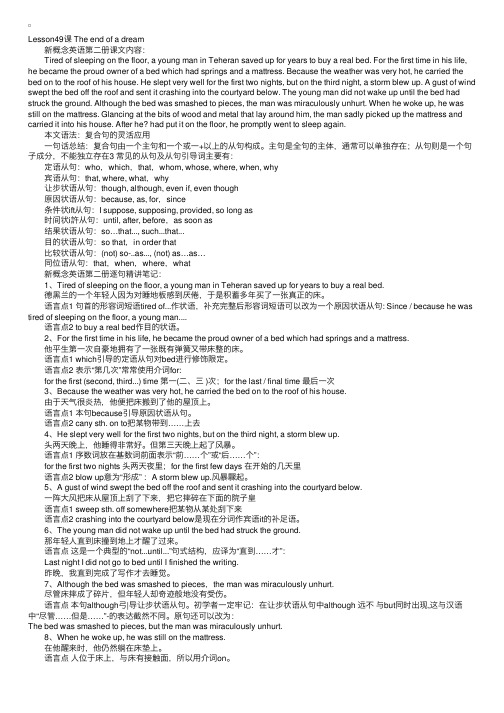
Lesson49课 The end of a dream 新概念英语第⼆册课⽂内容: Tired of sleeping on the floor, a young man in Teheran saved up for years to buy a real bed. For the first time in his life, he became the proud owner of a bed which had springs and a mattress. Because the weather was very hot, he carried the bed on to the roof of his house. He slept very well for the first two nights, but on the third night, a storm blew up. A gust of wind swept the bed off the roof and sent it crashing into the courtyard below. The young man did not wake up until the bed had struck the ground. Although the bed was smashed to pieces, the man was miraculously unhurt. When he woke up, he was still on the mattress. Glancing at the bits of wood and metal that lay around him, the man sadly picked up the mattress and carried it into his house. After he? had put it on the floor, he promptly went to sleep again. 本⽂语法:复合句的灵活应⽤ ⼀句话总结:复合句由⼀个主句和⼀个或⼀+以上的从句构成。
新概念二 Lesson49 The end of the dream

saved up for years to buy a real bed.
1. Being tired of sleeping on the floor, a young man in Teheran saved up for
years to buy a real bed. doing分词;主动
语言省略二原则:
4.spring n.弹簧 春天;泉水
Jinan is a city of springs.
5.mattress n.床垫
mat n. 杯垫)
cushion n. 座垫
6.gust n.一阵狂风 a gust of anger (一阵)无名火 breeze n. 微风 wind n. 风(总称)
是不是所有的状语从 句都能省略成分词作
状语?
3.Because the weather was very hot, he carried the bed on to the roof of his house.
总结: 两件事主语相同 一件事写成句子;另一件事写成分词作状语。
我走进教室,拿着一个包。 _I w__a_lk_e_d__in_t_o_t_h_e_c_la_s_s_r_o_o_m_,_t_a_k_in_g__a_b_a_g_._________________
n.主人
of a bed which had springs and a mattress.
n.弹簧
n.床垫
Unit1 The end of dream (2)
3.Because the weather was very hot, he carried the bed on to the roof of his house.
新概念英语第二册:第49课课文详解及语法解析

【导语】新概念英语作为家喻户晓的经典之作,它有着全新的教学理念,有趣的课⽂内容及其全⾯的技能训练,为⼴⼤的英语学习者提供帮助!如果你也想学好英语,⼜怎能错过新概念英语?下⾯为您提供了相关内容,希望对您有所帮助! 课⽂详注 Further notes on the text 1.Tired of sleeping on the floor, a young man in Teheran saved up for years to buy a real bed. 德⿊兰的⼀个年轻⼈由于对睡地板感到厌倦,于是积蓄多年买了⼀张真正的床。
(1)tired引导的分词短语省略了开头的being,其作⽤相当于原因状语从句:As he was tired of…。
sleeping为动名词,作介词of的宾语。
(2)save up为固定短语,表⽰“储蓄”、“攒钱”: I want to get married in one or two years, so I'm trying to save(some money)up. 我想⼀两年之间内结婚,所以我在设法攒钱。
(3)to在这⾥⽤于表⽰⽬的,相当于in order to: I got up early to have a swim. 为了游泳我起了个⼤早。
2.…he carried the bed on to the roof of his house.……他便把床搬到了他的屋顶上。
介词onto可拼写成⼀个词,也可拼写成两个词(on to)。
它⽤于表⽰动作⽅向⽽不⽤于表⽰静态的位置(与into相似): I put the pen onto/ on the table. 我把笔放到桌⼦上。
The pen is on the table. 笔在桌⼦上。
(不可⽤onto/ on to)onto/ on to有时可⽤on代替,但表⽰位置的on不可⽤onto代替: Mr. Thompson jumped onto the stage. 汤普森先⽣跳上了台上。
新概念英语第二册第49课theendofadream美梦告终
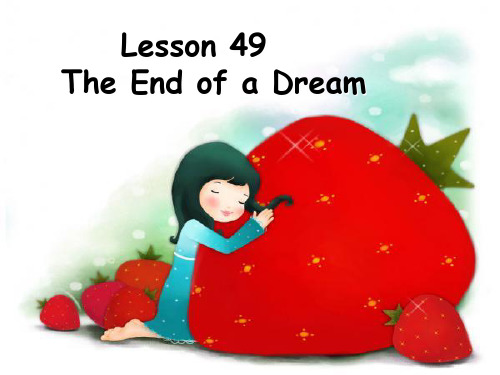
II. New words and expressions
tired
adj. 厌烦的
tiTreedheran adj.n. 厌德烦黑的兰
Teheran n.
德黑兰
rreeaal l
adj.adj. 真正真的正的
owonwerner n. n. 主主人人
sprsinpgring mattress
n. n. n.
buy for the first time of his life?
2. This young man bought a bed
which had springs and mattress.
3. 2. What happened on the third night?
4. A gust of wind swept the bed off the
unhurt.
Next… Iv. Language points
新概念英语第二册第49课 theendofadream美梦告终
Iv. Language points
1.厌倦某事/厌倦做某事 be tired of sth/ doing sth
活学活用
当一个人厌倦伦敦 时,他必定也厌倦 了人生。
smash v. 碰碎, 摔碎 ① vt.&vi. 打碎,摔碎,(使)碎裂
The cup smashed on the floor. smash sth. into pieces 把……摔成碎片 The bed was smashed to piece. crash v. 受挤压而变碎 The egg is easy to crash. cut sth. into pieces 切碎, 剪碎 tear sth. into pieces 撕碎 break v. 打碎 crack v. 裂开不碎 ② vt.&vi. 重击,殴打,猛砸/撞 Why didn’t you smash the man with your fist? A car smashed into the wall. 新概念英语第二册第49课
新概念英语第二册第49课-The end of a dream

新概念英语第二册第49课:The end of a dreamHow did the dream endTired of sleeping on the floor, a young man in Teheran saved up for years to buy a real bed. For the first time in his life, he became the proud owner of a bed which had springs and a mattress. Because the weather was very hot, he carried the bed on to the roof of his house. He slept very well for the first two nights, but on the third night, a storm blew up. A gust of wind swept the bed off the roof and sent it crashing into the courtyard below. The young man did not wake up until the bed had struck the ground. Although the bed was smashed to pieces, the man was miraculously unhurt. When he woke up, he was still on the mattress. Glancing at the bits of wood and metal that lay around him, the man sadly picked up the mattress and carried it into his house. After he had put it on the floor, he promptly went to sleep again.参考译文德黑兰的一个人年轻人由于对睡地板感到厌倦,于是积蓄多年买了一张真正的床。
裕兴新概念英语第二册笔记第49课之欧阳数创编
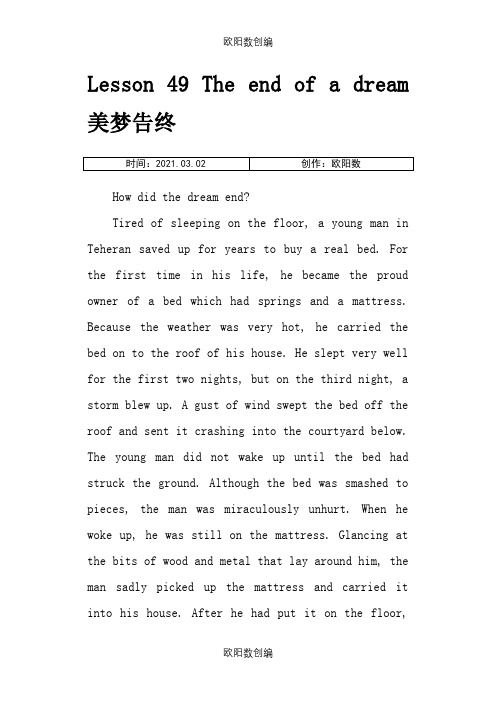
Lesson 49 The end of a dream 美梦告终How did the dream end?Tired of sleeping on the floor, a young man in Teheran saved up for years to buy a real bed. For the first time in his life, he became the proud owner of a bed which had springs and a mattress. Because the weather was very hot, he carried the bed on to the roof of his house. He slept very well for the first two nights, but on the third night, a storm blew up. A gust of wind swept the bed off the roof and sent it crashing into the courtyard below. The young man did not wake up until the bed had struck the ground. Although the bed was smashed to pieces, the man was miraculously unhurt. When he woke up, he was still on the mattress. Glancing at the bits of wood and metal that lay around him, the man sadly picked up the mattress and carried it into his house. After he had put it on the floor,he promptly went to sleep again.参考译文德黑兰的一个人年轻人由于对睡地板感到厌倦,于是积蓄多年买了一张真正的床。
新概念英语单词第二册第49课:美梦告终

新概念英语单词第⼆册第49课:美梦告终新概念英语单词第⼆册第49课:美梦告终 tired [ta??d] 厌烦的【单词扩充】weary厌烦的【单词搭配】be tired of厌倦【单词例句】A: I'm tired of my job.A:我厌烦了我的⼯作。
B: You can change it for another one then.B:那你能够换⼀份⼯作啊。
real [ri?l] adj.真正的owner ['??n?] 主⼈spring [spr??] 弹簧【单词例句】A: The mattress is made of spring wiresA:这个床垫是⽤弹簧做的。
B:How is the quality?B:质量怎么样?mattress ['m?tr?s] 床垫【单词扩充】cushion垫⼦【单词例句】A: He kept his bankbooks under his mattress.A:他将他的存折藏在了床垫底下。
B:How do you know that?B:你是怎么知道的?gust [g?st] ⼀阵狂风sweep [swi?p] (swept ,sweptl,swept) v.扫,刮【单词例句】A: Please sweep the floor when I'm doingthe washing. A:我洗⾐服的时候你把地扫扫。
B: But I'm watching TV now.B:可我正在看电视呢。
courtyard ['k??tjɑ?d] 院⼦【单词例句】There is a tall tree in our courtyard.我们院⼦⾥有⼀棵极⼤的树。
【单词扩充】compound院⼦smash [sm??] 碰碎,摔碎【派⽣词】smashing猛烈的【单词扩充】smash sth.down击倒某物【单词例句】A: Oh, what happened to my bike?A:噢,我的⾃⾏车怎么了?B: I'm really sorry. It got smashed by a truck.B:我⾮常抱歉,⾃⾏车给卡车撞坏了。
- 1、下载文档前请自行甄别文档内容的完整性,平台不提供额外的编辑、内容补充、找答案等附加服务。
- 2、"仅部分预览"的文档,不可在线预览部分如存在完整性等问题,可反馈申请退款(可完整预览的文档不适用该条件!)。
- 3、如文档侵犯您的权益,请联系客服反馈,我们会尽快为您处理(人工客服工作时间:9:00-18:30)。
逐句精讲新概念英语第二册:第49课美
梦告终
Lesson49课 The end of a dream
新概念英语第二册课文内容:
Tired of sleeping on the floor, a young man in Teheran saved up for years to buy a real bed. For the first time in his life, he became the proud owner of a bed which had springs and a mattress. Because the weather was very hot, he carried the bed on to the roof of his house. He slept very well for the first two nights, but on the third night, a storm blew up. A gust of wind swept the bed off the roof and sent it crashing into the courtyard below. The young man did not wake up until the bed had struck the ground. Although the bed was smashed to pieces, the man was miraculously unhurt. When he woke up, he was still on the mattress. Glancing at the bits of wood and metal that lay around him, the man sadly picked up the mattress and carried it into his house. After he? had put it on the floor, he promptly went to sleep again.
本文语法:复合句的灵活应用
一句话总结:复合句由一个主句和一个或一+以上的从句构成。
主句是全句的主体,通常可以单独存在;从句则是一个句子成分,不能独立存在3 常见的从句及从句引导词主要有:
定语从句:who,which,that,whom, whose, where, when, why
宾语从句:that, where, what,why
让步状语从句:though, although, even if, even though
原因状语从句:because, as, for,since
条件状ift从句:I suppose, supposing, provided, so long as
时间状i許从句:until, after, before,as soon as
结果状语从句:so…that..., such...that...
目的状语从句:so that,in order that
比较状语从句:(not) so-..as..., (not) as…as…
同位语从句:that,when,where,what
新概念英语第二册逐句精讲笔记:
1、Tired of sleeping on the floor, a young man in Teheran saved up for years to buy a real bed.
德黑兰的一个年轻人因为对睡地板感到厌倦,于是积蓄多年买了一张真正的床。
语言点1 句首的形容词短语tired of...作状语,补充完整后形容词短语可以改为一个原因状语从句: Since / because he was tired of sleeping on the floor, a young man....
语言点2 to buy a real bed作目的状语。
2、For the first time in his life, he became the proud owner of a bed which had springs and a mattress.
他平生第一次自豪地拥有了一张既有弹簧又带床整的床。
语言点1 which引导的定语从句对bed进行修饰限定。
语言点2 表示“第几次”常常使用介词for:
for the first (second, third...) time 第一(二、三 )次;for the last / final time 最后一次
3、Because the weather was very hot, he carried the bed on to the roof of his house.
由于天气很炎热,他便把床搬到了他的屋顶上。
语言点1 本句because引导原因状语从句。
语言点2 cany sth. on to把某物带到……上去
4、He slept very well for the first two nights, but on the third night, a storm blew up.
头两天晚上,他睡得非常好。
但第三天晚上起了风暴。
语言点1 序数词放在基数词前面表示“前……个”或“后……个”:
for the first two nights 头两天夜里;for the first few days 在开始的几天里
语言点2 blow up意为“形成”:A storm blew up.风暴驟起。
5、A gust of wind swept the bed off the roof and sent it crashing into the courtyard below.
一阵大风把床从屋顶上刮了下来,把它摔碎在下面的院子皇
语言点1 sweep sth. off somewhere把某物从某处刮下来
语言点2 crashing into the courtyard below是现在分词作宾语it的补足语。
6、The young man did not wake up until the bed had struck the ground.
那年轻人直到床撞到地上才醒了过来。
语言点这是一个典型的“not...until...”句式结构,应译为“直到……才”:
Last night I did not go to bed until I finished the writing.
昨晚,我直到完成了写作才去睡觉。
7、Although the bed was smashed to pieces,the man was miraculously unhurt.
尽管床摔成了碎片,但年轻人却奇迹般地没有受伤。
语言点本句although弓|导让步状语从句。
初学者一定牢记:在让步状语从句中although 远不与but同时出现,这与汉语中“尽管……但是……”-的表达截然不同。
原句还可以改为:
The bed was smashed to pieces, but the man was miraculously unhurt.
8、When he woke up, he was still on the mattress.
在他醒来时,他仍然躺在床垫上。
语言点人位于床上,与床有接触面,所以用介词on。
